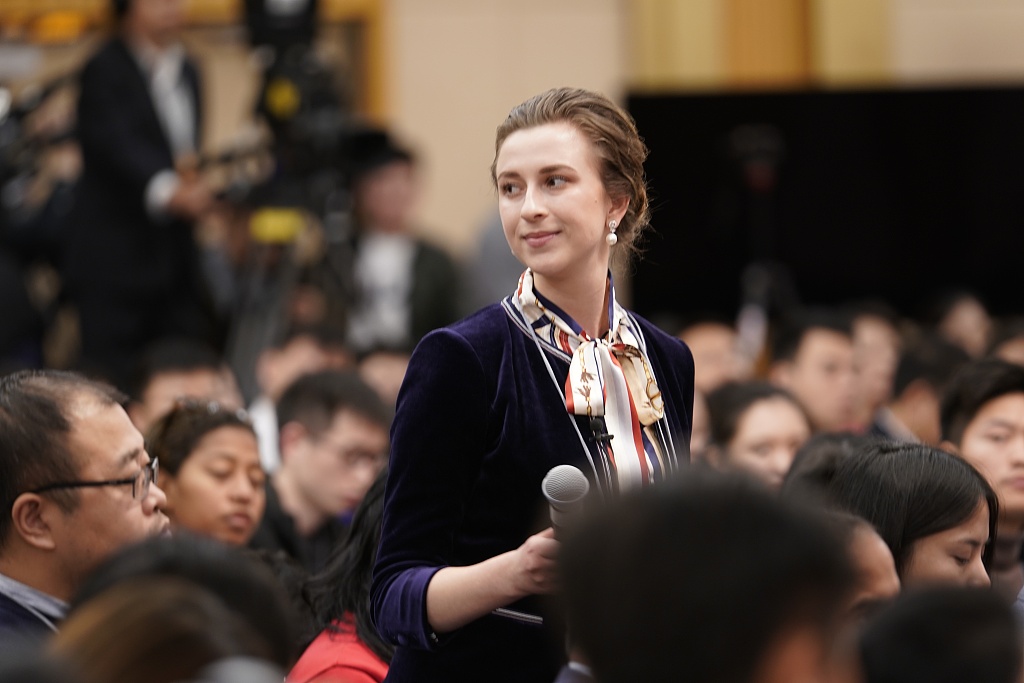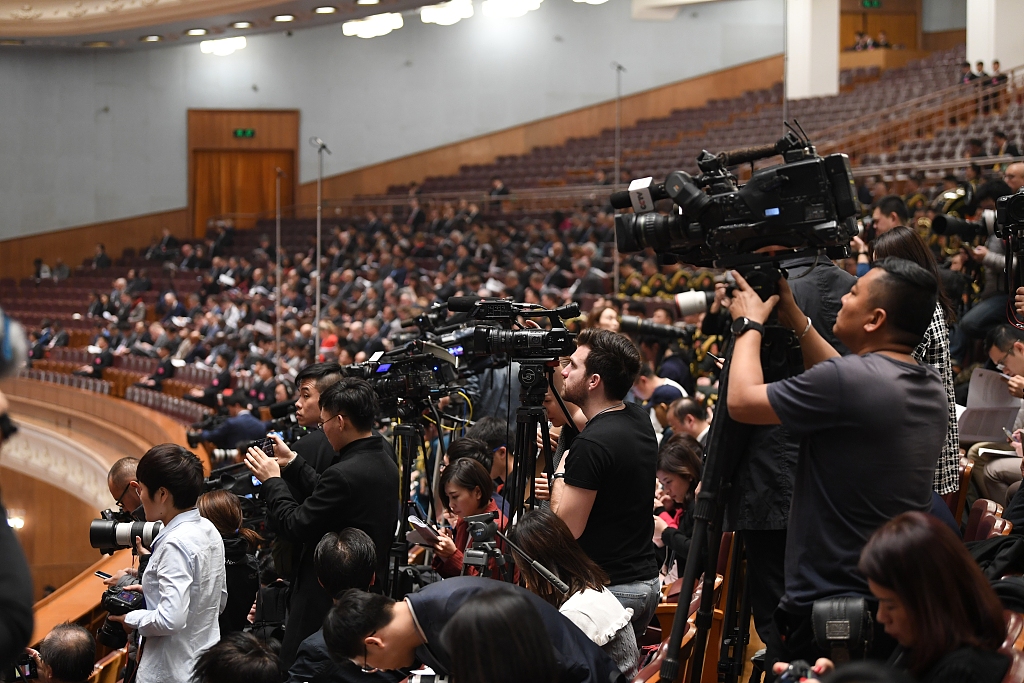
A journalist attends the press conference for the second session of the CPPCC on March 2. (Photo: VCG)
As thousands of Chinese legislators and political advisors gather in Beijing for the fortnight-long two sessions, the nation’s annual event has drawn worldwide attention as the best window to view China. Coming under the spotlight, the economic growth target, the foreign investment law and reform measures such as tax reduction mentioned in the government work report have received positive feedback from global media.
The two sessions “offer a rare chance for thousands of journalists from around the world to hear from and interact with the people involved in running the world’s second-largest economy,” Bloomberg reported on eve of China's “two sessions.”
Economic growth target in line with expectations
China has set its GDP growth target at 6-6.5 percent for 2019, Chinese Premier Li Keqiang said on March 5. The target set for 2019 is considered “in line with expectations,” showing sustainability in China’s economic growth.
The move to change China’s economic growth target from a single figure while maintaining growth above 6 percent was in line with what many economists had expected, British newspaper Financial Times reported on March 5.
“Beijing’s economic target range was ‘sensible’ and reflected the ‘maturity’ of Chinese officials,” US business news channel CNBC reported on March 5, citing Tai Hui, Asia Pacific chief market strategist at JP Morgan Asset Management.
“It reflects top officials’ maturity in accepting that China needs to stabilize growth in a sustainable manner, instead of a rush of liquidity to the economy, as we saw in previous downturns,” Hui said in the CNBC story.

A journalist prepares to ask a question during a press conference for the second session of the 13th National People's Congress in Beijing on March 6, 2019. (Photo: VCG)
As a large locomotive pulling the global economy, China’s efforts to stabilize economic growth would enhance the confidence of development internationally.
An economist at Cornell University, Eswar Prasad, said in a story with Associated Press on March 6 that a more manageable pace of growth in China could benefit the global economy in the long run. “Slower but more balanced growth in China, especially if it was driven by domestic consumption demand and involved fewer financial system risks, could be a net positive for the world economy,” he said.
“Such a growth rate, if achieved, would be among the world’s strongest,” said the author of the AP story, Joe McDonald.
Foreign investment law is highly-anticipated
A draft of China's foreign investment law was submitted Friday afternoon to the second session of the 13th National People's Congress for deliberation, and a final vote on the draft is scheduled for March 15. As a comprehensive and fundamental set of legal standards for foreign investment activities in China under new circumstances, the foreign investment law has become one of the hottest topics in the financial world.
“This could be one of the most significant legislative efforts from this year’s two sessions,” Indian newspaper Hindustan Times reported citing economist Li Daxiao on March 3.
The newspaper said that the draft law on foreign investment, if passed, will ensure greater market access to foreign companies and provide equal protection.
The draft law has gone through two readings by the National People’s Congress (NPC) Standing Committee. Once adopted, the unified law will replace the three existing laws on Chinese-foreign equity joint ventures, wholly foreign-owned enterprises and Chinese-foreign contractual joint ventures.
French news agency Agence France-Presse described the foreign investment law as “a highly-anticipated bill” in a story on March 4. The article further cited NPC spokesman Zhang Yesui’s quote that "this is a fundamental change in our foreign investment management system, which will improve the openness, transparency and predictability of the investment environment."
Tim Stratford, chairman of the American Chamber of Commerce in China, said in another CNBC story on March 4 that the foreign investment law is a statement “on a lot of aspirations” and “those are positive,” while businesses are waiting for further details of the law.
Reform measures hailed by overseas media
The government work report delivered by Premier Li outlined a set of measures to deepen reform, and tax cuts is one of them. China will reduce the tax burdens and social insurance contributions of enterprises by nearly 2 trillion yuan (about $298 billion) this year, according to the report.
As American Broadcasting Corporation reported on March 5, the Chinese government is expected to use this year's session to announce measures to support economic growth, including tax cuts, and more assistance for entrepreneurs who generate China's new jobs and wealth.
In a story on March 5, Reuters mentioned that those tax cuts are more aggressive than the 1.3 trillion yuan delivered in 2018 and include reductions aimed at supporting the manufacturing, transportation and construction sectors.
To stimulate growth, Li also said in the report that China will reduce the current value-added tax rate of 16 percent for manufacturing and other industries to 13 percent, while lowering the rate for such industries as transportation and construction from 10 percent to 9 percent.
This move was reported by The Financial Times on March 5 as “aimed at helping manufacturers.” The story quoted Robin Xing, an economist at Morgan Stanley, as suggesting that the cut is “above market expectations and should boost corporate earnings.”

Journalists attend the opening of the second session of the CPPCC at the Great Hall of the People in Beijing on March 3. (Photo: VCG)


